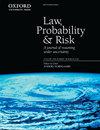Corporate Crime and Punishment: An Empirical Study
IF 2.7
4区 社会学
Q1 LAW
引用次数: 3
Abstract
For many years, law and economics scholars, as well as politicians and regulators, have debated whether corporate criminal enforcement overdeters beneficial corporate activity or in the alternative, lets corporate criminals off too easily. This debate has recently expanded in its polarization: On the one hand, academics, judges, and politicians have excoriated enforcement agencies for failing to send guilty bankers to jail in the wake of the 2008 financial crisis; on the other, the U.S. Department of Justice has since relaxed policies that encouraged individual prosecutions and reduced the size of fines and number of prosecutions. A crucial and yet understudied piece of evidence in this debate is to understand how corporate crime rates have responded to changes in enforcement practices. And yet, unlike most other types of crime, the government does not provide data about corporate crime levels. Therefore, we cannot easily determine whether these policy changes are effectively deterring future incidents of crime. In this paper, we take important first steps in determining whether corporate crime, and financial institution crime in particular, is on the rise. Specifically, we proxy for corporate crime using three novel sources: the Financial Crimes Enforcement Network (FinCEN) Suspicious Activity Reports (SARs), consumer complaints made to the Consumer Financial Protection Bureau (CFPB), and whistleblower complaints made to the Securities and Exchange Commission (SEC). Each source reveals an increase in complaints or reports indicative of corporate misconduct in the wake of the 2008 financial crisis. We also examine levels of public company recidivism and find that they are also on the rise. And we document a potential explanation: recidivist companies are much larger than non-recidivist companies, but they receive smaller fines than non-recidivist companies (measured as a percentage of market capitalization and revenue). Put simply, for large companies, criminal penalties may be just another cost of doing business—and quite a low cost at that. We conclude by offering recommendations for enforcement agencies and policymakers. In particular, our results suggest that enforcers are unlikely to achieve optimal deterrence using fines alone. Enforcement agencies should therefore consider other ways of securing deterrence, such as by seeking penalties against guilty individuals and the top executives who facilitate their crimes.企业犯罪与处罚:实证研究
多年来,法律和经济学学者,以及政界人士和监管机构一直在争论,企业刑事执法是否会过度阻止有益的企业活动,或者相反,是否会让企业罪犯太容易逃脱惩罚。最近,这场辩论在两极分化中愈演愈烈:一方面,学者、法官和政界人士严厉指责执法机构未能在2008年金融危机后将有罪的银行家送进监狱;另一方面,美国司法部放宽了鼓励个人起诉的政策,减少了罚款金额和起诉数量。在这场辩论中,一个至关重要但尚未得到充分研究的证据是,了解企业犯罪率如何对执法实践的变化做出反应。然而,与大多数其他类型的犯罪不同,政府不提供有关企业犯罪水平的数据。因此,我们不能轻易确定这些政策变化是否有效地阻止了未来的犯罪事件。在本文中,我们采取了重要的第一步来确定公司犯罪,特别是金融机构犯罪是否在上升。具体来说,我们使用三个新来源来代理公司犯罪:金融犯罪执法网络(FinCEN)可疑活动报告(sar),消费者向消费者金融保护局(CFPB)提出的投诉,以及向证券交易委员会(SEC)提出的举报人投诉。每个消息来源都显示,2008年金融危机之后,有关企业不当行为的投诉或报告有所增加。我们还研究了上市公司的再犯水平,发现它们也在上升。我们记录了一个潜在的解释:累犯公司比非累犯公司大得多,但他们收到的罚款比非累犯公司少(以市值和收入的百分比衡量)。简单地说,对大公司来说,刑事处罚可能只是做生意的另一种成本——而且是相当低的成本。最后,我们为执法机构和政策制定者提供了建议。特别是,我们的研究结果表明,执法者不太可能仅使用罚款来实现最佳威慑。因此,执法机构应考虑确保威慑的其他方式,例如寻求惩罚有罪的个人和为其犯罪提供便利的高级管理人员。
本文章由计算机程序翻译,如有差异,请以英文原文为准。
求助全文
约1分钟内获得全文
求助全文
来源期刊

Law Probability & Risk
MATHEMATICSSTATISTICS & PROBABILITY&-STATISTICS & PROBABILITY
CiteScore
2.10
自引率
28.60%
发文量
8
期刊介绍:
Law, Probability & Risk is a fully refereed journal which publishes papers dealing with topics on the interface of law and probabilistic reasoning. These are interpreted broadly to include aspects relevant to the interpretation of scientific evidence, the assessment of uncertainty and the assessment of risk. The readership includes academic lawyers, mathematicians, statisticians and social scientists with interests in quantitative reasoning.
The primary objective of the journal is to cover issues in law, which have a scientific element, with an emphasis on statistical and probabilistic issues and the assessment of risk.
Examples of topics which may be covered include communications law, computers and the law, environmental law, law and medicine, regulatory law for science and technology, identification problems (such as DNA but including other materials), sampling issues (drugs, computer pornography, fraud), offender profiling, credit scoring, risk assessment, the role of statistics and probability in drafting legislation, the assessment of competing theories of evidence (possibly with a view to forming an optimal combination of them). In addition, a whole new area is emerging in the application of computers to medicine and other safety-critical areas. New legislation is required to define the responsibility of computer experts who develop software for tackling these safety-critical problems.
 求助内容:
求助内容: 应助结果提醒方式:
应助结果提醒方式:


